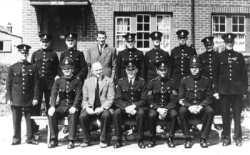Police in Essex during the Great War
At the start of the great War, Essex County
Constabulary has about 400 Police Officers of which over a
quarter joined the armed forces.
The gap was filled by the recruitment of
Special Constables from men who were too old to qualify for
Kitchener's New Army.
Recruiting for the new Special Constabulary
was brisk and 6,000 men were quickly appointed. This number
would grow to 10,000 by the end of the war. This meant that
there were more Policemen on duty during the war than in the
period before or after.
The new Specials patrolled their locality
and enforced regulations such as the blackout and security for
war related matters. This often meant boring shifts of checking
telegraph poles although it did include questioning any
foreigners encountered in case they were spies.
They were provided with an armband and a
truncheon and expected to work 4 hour shifts in addition to
their normal employment.
As the war progressed they were issued with
a police uniform although they were issued with caps rather than
helmets.
The remaining regular police continued to
enforce the non war regulations and investigate crime although
as the skill of the Specials developed they became fully
involved in police work.
Even villages were provided with Special
Constables after the following Home Office advice.
Each parish should depend upon
1/ A Police Constable with protective
clothing
2/ Two or three volunteer Special
Constables
3/ Three air raid wardens for each 500
people of the population
4/ A first aid post
5/ Voluntary help from the men of the
village
6/ The trained sense of the village
The success of Special Constables was so
great that the experiment was repeated in the Second World War.



